新概念英语第三册语法精粹(终稿)
新概念第三册语法总结
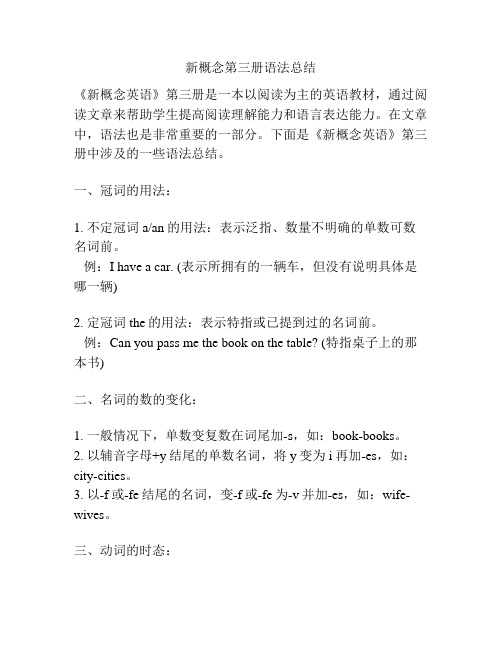
新概念第三册语法总结《新概念英语》第三册是一本以阅读为主的英语教材,通过阅读文章来帮助学生提高阅读理解能力和语言表达能力。
在文章中,语法也是非常重要的一部分。
下面是《新概念英语》第三册中涉及的一些语法总结。
一、冠词的用法:1. 不定冠词a/an的用法:表示泛指、数量不明确的单数可数名词前。
例:I have a car. (表示所拥有的一辆车,但没有说明具体是哪一辆)2. 定冠词the的用法:表示特指或已提到过的名词前。
例:Can you pass me the book on the table? (特指桌子上的那本书)二、名词的数的变化:1. 一般情况下,单数变复数在词尾加-s,如:book-books。
2. 以辅音字母+y结尾的单数名词,将y变为i再加-es,如:city-cities。
3. 以-f或-fe结尾的名词,变-f或-fe为-v并加-es,如:wife-wives。
三、动词的时态:1. 一般现在时:表示习惯性、经常性或客观真理等。
例:Water boils at 100 degrees Celsius. (客观真理)2. 一般过去时:表示过去发生或存在的动作或状态。
例:She lived in London for five years. (过去发生的动作)3. 现在进行时:表示现在正在进行的动作。
例:I am reading a book now. (正在进行的动作)4. 过去进行时:表示过去某一时间正在进行的动作。
例:He was studying when I called him. (过去某一时间正在进行的动作)5. 一般将来时:表示将来某一时间将要发生的动作。
例:I will go to the cinema tomorrow. (将来某一时间将要发生的动作)四、形容词和副词的比较等级:1. 一般形容词比较等级:例:good - better - best (好 - 更好 - 最好)2. 以-y结尾的形容词,变-y为-i,再加-er或-est:例:happy - happier - happiest (快乐 - 更快乐 - 最快乐)五、连词的用法:1. 并列连词and:用于连接并列的词、短语、从句等。
(完整word版)新概念英语第三册重点语法总结:名词性从句,推荐文档.docx
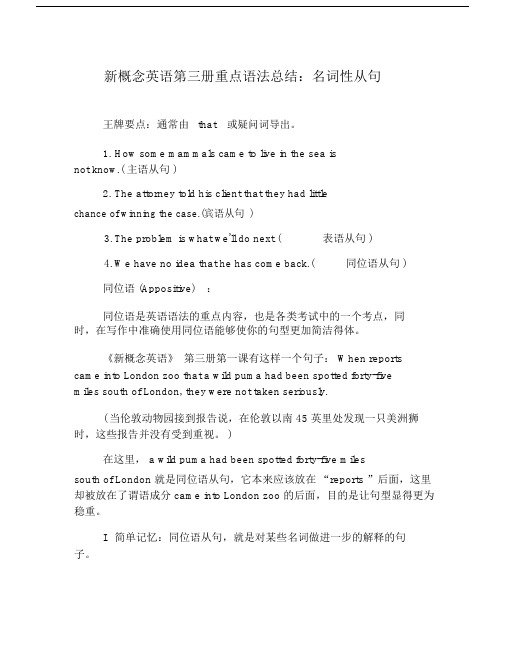
新概念英语第三册重点语法总结:名词性从句王牌要点:通常由that或疑问词导出。
1.How some mammals came to live in the sea isnot know.( 主语从句 )2.The attorney told his client that they had littlechance of winning the case.(宾语从句)3.The problem is what we'll do next.(表语从句 )4.We have no idea that he has come back.(同位语从句 )同位语 (Appositive):同位语是英语语法的重点内容,也是各类考试中的一个考点,同时,在写作中准确使用同位语能够使你的句型更加简洁得体。
《新概念英语》第三册第一课有这样一个句子: When reports came into London zoo that a wild puma had been spotted forty-fivemiles south of London, they were not taken seriously.( 当伦敦动物园接到报告说,在伦敦以南 45 英里处发现一只美洲狮时,这些报告并没有受到重视。
)在这里, a wild puma had been spotted forty-five milessouth of London 就是同位语从句,它本来应该放在“reports ”后面,这里却被放在了谓语成分 came into London zoo 的后面,目的是让句型显得更为稳重。
I.简单记忆:同位语从句,就是对某些名词做进一步的解释的句子。
I was greatly shocked when I heard the news that hisfather died yesterday.(that 引的句子解了news 的内容,注意: that不做任何成分)We have to face the fact that the weather isunexpectedly bad.(that 引的句子解了fact的内容)II.想:能接同位从句的名有:belief(信仰),fact,idea,doubt,rumor( 言 ) ,evidence( 据 ) ,conclusion() ,suggestion(建) ,problem ,order ,answer,discovery()explanation(解) ,principle(原),possibility(可能性),truth,promise(承) ,report( 告 ) ,statement( 声明 ) ,knowledge( 知 ) ,opinion( 点 ) ,likelihood(可能性)[大声朗三遍,背下即可。
2021年新概念英语第3册语法
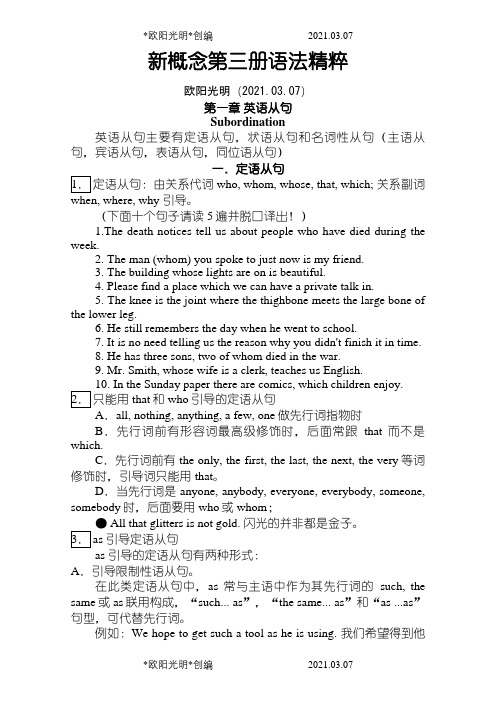
新概念第三册语法精粹欧阳光明(2021.03.07)第一章英语从句Subordination英语从句主要有定语从句,状语从句和名词性从句(主语从句,宾语从句,表语从句,同位语从句)一.定语从句定语从句:由关系代词 who, whom, whose, that, which; 关系副词引导。
(下面十个句子请读 5遍并脱口译出!)1.The death notices tell us about people who have died during the week.2. The man (whom) you spoke to just now is my friend.3. The building whose lights are on is beautiful.4. Please find a place which we can have a private talk in.5. The knee is the joint where the thighbone meets the large bone of the lower leg.6. He still remembers the day when he went to school.7. It is no need telling us the reason why you didn't finish it in time.8. He has three sons, two of whom died in the war.9. Mr. Smith, whose wife is a clerk, teaches us English.10. In the Sunday paper there are comics, which children enjoy.只能用that和who引导的定语从句A.all, nothing, anything, a few, one做先行词指物时B.先行词前有形容词最高级修饰时,后面常跟that而不是which.C.先行词前有 the only, the first, the last, the next, the very等词修饰时,引导词只能用that。
新概念英语第三册语法精粹汇总
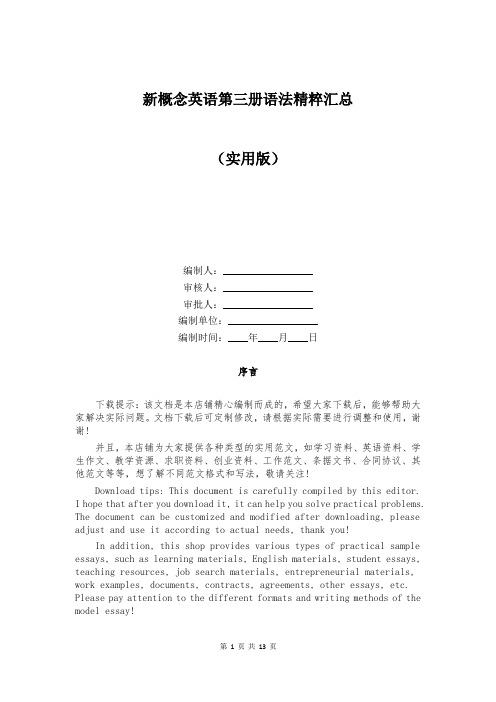
新概念英语第三册语法精粹汇总(实用版)编制人:__________________审核人:__________________审批人:__________________编制单位:__________________编制时间:____年____月____日序言下载提示:该文档是本店铺精心编制而成的,希望大家下载后,能够帮助大家解决实际问题。
文档下载后可定制修改,请根据实际需要进行调整和使用,谢谢!并且,本店铺为大家提供各种类型的实用范文,如学习资料、英语资料、学生作文、教学资源、求职资料、创业资料、工作范文、条据文书、合同协议、其他范文等等,想了解不同范文格式和写法,敬请关注!Download tips: This document is carefully compiled by this editor.I hope that after you download it, it can help you solve practical problems. The document can be customized and modified after downloading, please adjust and use it according to actual needs, thank you!In addition, this shop provides various types of practical sample essays, such as learning materials, English materials, student essays, teaching resources, job search materials, entrepreneurial materials, work examples, documents, contracts, agreements, other essays, etc. Please pay attention to the different formats and writing methods of the model essay!新概念英语第三册语法精粹汇总学习新概念英语并不难啊。
新概念英语第三册语法精粹汇总
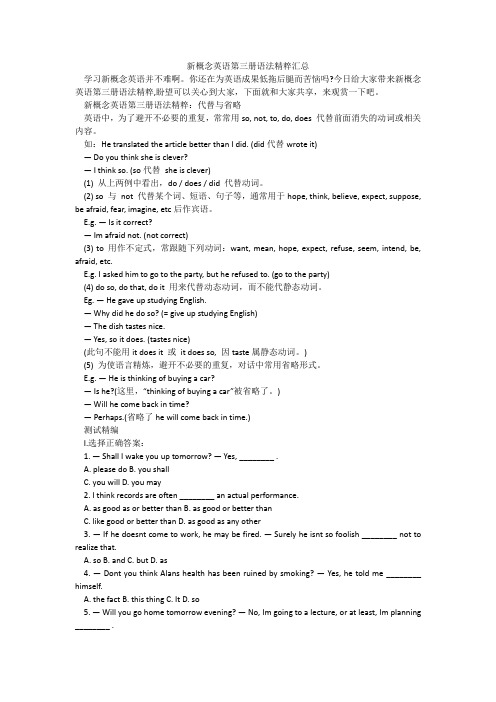
新概念英语第三册语法精粹汇总学习新概念英语并不难啊。
你还在为英语成果低拖后腿而苦恼吗?今日给大家带来新概念英语第三册语法精粹,盼望可以关心到大家,下面就和大家共享,来观赏一下吧。
新概念英语第三册语法精粹:代替与省略英语中,为了避开不必要的重复,常常用so, not, to, do, does 代替前面消失的动词或相关内容。
如:He translated the article better than I did. (did代替wrote it)— Do you think she is clever?— I think so. (so代替she is clever)(1) 从上两例中看出,do / does / did 代替动词。
(2) so 与not 代替某个词、短语、句子等,通常用于hope, think, believe, expect, suppose, be afraid, fear, imagine, etc后作宾语。
E.g. — Is it correct?— Im afraid not. (not correct)(3) to 用作不定式,常跟随下列动词:want, mean, hope, expect, refuse, seem, intend, be, afraid, etc.E.g. I asked him to go to the party, but he refused to. (go to the party)(4) do so, do that, do it 用来代替动态动词,而不能代静态动词。
Eg. — He gave up studying English.— Why did he do so? (= give up studying English)— The dish tastes nice.— Yes, so it does. (tastes nice)(此句不能用it does it 或it does so, 因taste属静态动词。
新概念第三册必会语法精粹:形容词

新概念第三册必会语法精粹:形容词定义:形容词是用来修饰名词的词,描述名词的性质、外观、特点等。
功能:形容词能够做定语、表语或补助语。
分类:主要分为两类:描绘性形容词和限定性形容词。
● 描绘性形容词主要用来描绘大、小、新旧、颜色、质量等。
● 限定性形容词主要用来限定所修饰词的数量、距离及范围所属等。
1.当形容词修饰单数可数名词时,必须与冠词连用:a lovely girl, the naughty boy2.形容词可与系动词连用,做表语,说明主语的性状。
常用系动词有:be,become,seem,appear,feel,look,taste,smell,sound,remain,go,turn,keep,stay, etc.The dish tastes delicious.The music sounds sweet.The milk went bad.小心陷阱 feel,smell,taste,look,keep有时能够用作实义动词,并能够用副词修饰。
He looked me up and down carefully.I tasted the soup slowly to see whether it was salty.3.形容词用作后置定语。
(简单理解:一般的形容词修饰名词时放在名词前面,但有些形容词修饰名词时放在名词的后面)a river navigable(一条可通航的河)sight visible可见的景象person responsible(负责人)注意:responsible person(有责任心的人)the best way possible(尽可能好的办法)the number necessary(必要的数量)the people present(在场的人)4.只能作表语的形容词1.某些表示健康状况的形容词。
well(身体好的),ill(病的),faint(虚弱的),poorly(身体不好的)示例:His mother has been ill for a long time.特别注意:sick是个特例。
新概念第三册核心语法整理

单元二:倒装句(1)否定词在前的情况完全倒装:谓语部分倒装:助动词(系动词+情态动词)1.no sooner had he arrived than they asked him to l eave again.2.Hardly had he begun to speak when the audience interrupted him.3.Not until he comes back will I go to sl eep(not until 主句部分倒装,从句不倒装)4.Not until 1895 did Cornell University begin to offer a d egree in ornithol ogy.5.Not until linol eum was invented in 1860 did any house have hard-wearing,easy-to-cl ean fl ooring.6.At no time shoul d we divorce ourselves from the masses of the peopl e.(部分倒装)7.Not a singl e paper did he write l ast term.8.Nor for a moment can the man imagine that he woul d die abroad.倒装句(2)让步状语从句形容词/副词/名词+ as/ though +主语+谓语1.much as we may pride ourselves on our god taste, we are no l onger free tochoose the things we want.(副词)2.old as I am, I can still fight.(形容词)3.chil d though he is , he can do some cooking.(名词)动词(原型)+as/though+主语+助动词/情态动词1.try as I might, I coul d not lift the stone.2.Try hard as he will, he never seems abl e to do the word satisfactorily.特殊:as引导的原因状语从句也可以用倒装:tired as she was , I decided not to disturb her.长句:3.great succes s though you have achieved, you must not be conceited.4.Run dry as the see were to and crumble as the rocks were to , I woul d notbreak my promise.5.Only for one year as she has been here, she become quite an expert in thisfiel d.倒装句(3)方位副词前置there, here ,now ,then和up, d own, in , out等副词在句首,要完全倒装1.there appeared on the horizon a man on horseback, riding in my direction.Now comes your luck. Out rushed the littl e boy.主语是代词的时候不用倒装2.here he comes.3.Out he rushed.倒装句(4)补充地点介词短语:1.behind him hang the map.2.In this box is found the book.分词短语:1.lying on the fl oo r was a boy aged about fifteen.2.Discussed in the conference was a proposal to reform income taxes.表语(形容词,过去分词,介词短语):1.invicible are the forces of the pl2.gone are the days when were student s.3.Among the goods are appl es, oranges, bananas····同位语从句why:my original question why he do it has not been answered.Whether: he was again tortured by the doubt whether he coul d meet Mary at the station.单元三:独立主格结构:表示时间,原因,条件,方式和伴随情况自己主语+无动词分句现在分词:weather permitting, I will start tomorrow.过去分词:his homework done , Jim decided to go and see the pl ay.无动词独立结构:the meal over ,we began to work again.不定式独立结构:the detail s to be worked out l ater, the pl an was approved. With 引导的独立主格结构定语:the woman with a baby on her back is my sister原因状语:with his homework finished , he felt very happy.伴随状语:with his face covered tears, he ran into the room. With tears streaming down her cheeks, she sat there .1.sand is formed by the weathering and d ecomposition of all types of rock, it smost abundant mineral constitution being quart s.2.The job finished ,we went home st raight away.3.Two hundred peopl e died in the accident, many of them chil dren.4.There being nothing el se to do ,we l eft.5.I woul d not dare to go home without the job finished.过去分词作宾语补足语(-ed)See,hear,feel ,find ,think·······1.I saw the student s assembled in the hall.2.They found a beautifully-cooked wall et and notes turned to ash.单元四:原因状语从句:because , sine , as , now that, fornow that= seeing that =in that=considering thatthis machine differs from the other one in that it is more powerful.双重否定never fail to: cat s never fail t o fascinate human beingsnot without: he doesn’t have any meal without meat sno not: there is nothing that he can’t d o.单元五:so that 别忘了还有表示结果的意思:we all arrived at 8:00 so that the meeting began promptly.So···that···倒装:主句部分倒装,that从句不倒装1.So great is our passion for doing things for ourselves , that we are becomingincreasingly l ess dependent on specialized l abour.2.So quickly did the workmen finish their work that they were given a bonus.3.So inferior was the quality of the radio that I took it back and asked for abetter one.4.To such a degree was he hurt that he woul d never forgive you.Such+ a +形容词+ 单数名词=so+形容词+a+单数名词1.He was in such a bedraggl ed condition that an assistant refused to serve him.2.He was in so bedraggl ed a condition that····3.It was so hot a day that we went swimming.4.It is such nice weather that I woul d like to o the beach.(weather为不可数名词,只能用such)特殊:当强调的名词前有many, few, litter时,还是用so1.he took so many cases with him that he had to call a taxi2.he earned so littl e money that he coul d barely support his family.让步状语从句:though although (不能用but,但可以用yet强调转折)though she is not pretty, yet she is very l ovely.单元六:现在分词作状语同时发生:flying over the channel , the pil ot saw a meteorite.动作发生在主句之前:having noted d own our names ,the policeman dismissed us.条件状语:you will only make yourself more tired, keeping on your feet.结果:he applied more water to the fl ower, only making things worse.(结果置于句末,多和only 连用)单元七:woul d rather ···than····接动词原型:pl woul d rather pay l arge sums of money than have their life work destroyed by gangsters.It is time / Woul d rather +从句:虚拟语气,宁愿让某人干某事。
新概念英语第三册全部语法.doc
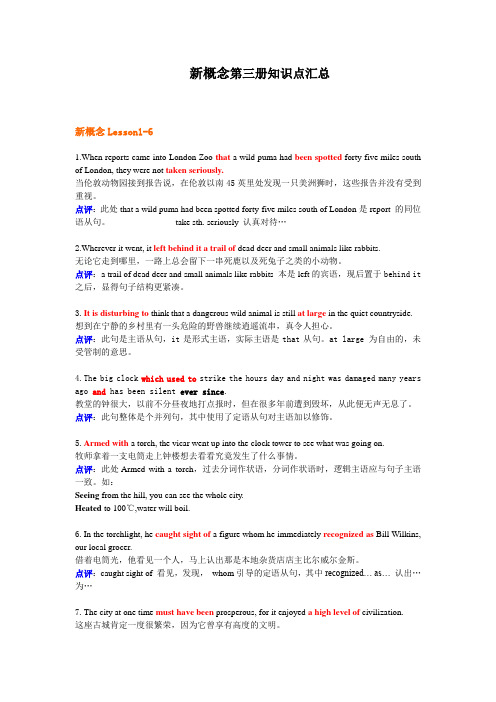
新概念第三册知识点汇总新概念Lesson1-61.When reports came into London Zoo that a wild puma had been spotted forty-five miles south of London, they were not taken seriously.当伦敦动物园接到报告说,在伦敦以南45英里处发现一只美洲狮时,这些报告并没有受到重视。
点评:此处that a wild puma had been spotted forty-five miles south of London是report 的同位语从句。
take sth. seriously 认真对待…2.Wherever it went, it left behind it a trail of dead deer and small animals like rabbits.无论它走到哪里,一路上总会留下一串死鹿以及死兔子之类的小动物。
点评:a trail of dead deer and small animals like rabbits本是left的宾语,现后置于behind it 之后,显得句子结构更紧凑。
3.It is disturbing to think that a dangerous wild animal is still at large in the quiet countryside.想到在宁静的乡村里有一头危险的野兽继续逍遥流串,真令人担心。
点评:此句是主语从句,it是形式主语,实际主语是that从句。
at large 为自由的,未受管制的意思。
4.The big clock which used to strike the hours day and night was damaged many years ago and has been silent ever since.教堂的钟很大,以前不分昼夜地打点报时,但在很多年前遭到毁坏,从此便无声无息了。
- 1、下载文档前请自行甄别文档内容的完整性,平台不提供额外的编辑、内容补充、找答案等附加服务。
- 2、"仅部分预览"的文档,不可在线预览部分如存在完整性等问题,可反馈申请退款(可完整预览的文档不适用该条件!)。
- 3、如文档侵犯您的权益,请联系客服反馈,我们会尽快为您处理(人工客服工作时间:9:00-18:30)。
B.as引导非限制性定语从句时,作用与which相同,as作为关系代词代替整个主句。
???(这是语法考试的一个考点。)
[注意区别]:
as引导的从句用于句首、句中或句后,而which引导的定语从句不能放在句首。
新概念三册语法精粹
第一章定语从句
1.定语从句:由关系代词who,whom,whose,that,which;关系副词when,where,why引导。
(下面十个句子请读5遍并脱口译出!)
1.Thedeathnoticestellusaboutpeoplewhohavediedduringtheweek.
?(Youdidn'tcomehereearlier.)
3.与将来事实相反的虚拟:
(1)If+should+v.,...would+v.
3.Theproblemiswhatwe'lldonext.(表语从句)
4.Wehavenoideathathehascomeback.(同位语从句)
?
同位语(Appositive):
同位语是英语语法的重点内容,也是各来自考试中的一个考点,同时,在写作中正确运用同位语可以使你的句型更加简洁得体。
《新概念英语》第三册第一课有这样一个句子:WhenreportscameintoLondonzoothatawildpumahadbeenspottedforty-fivemilessouthofLondon,theywerenottakenseriously.
③时间:after,before,when,while,as,until,assoonas,since,bythetime,once,lately,presently,shortlyafter,currently,atpresent,nowadays...
④条件:if,onlyif.,once,unless,intheevent(that),incase(that),providedthat,ontheconditionthat,etc.
2.与过去事实相反的虚拟:
If+haddone+...,...would(might)havedone...
IfIhadknownyourtelephonenumberyesterday,Iwouldhavephonedyou.
?(Ididn'tknowyourtelephonenumber.)
Ifyouhadcomeherealittleearlierjustnow,youmighthavemether.
10.IntheSundaypapertherearecomics,whichchildrenenjoy.
2.只能用that和who引导的定语从句
A.all,nothing,anything,afew,one做先行词指物时
B.先行词前有形容词最高级修饰时,后面常跟that而不是which.
C.先行词前有theonly,thefirst,thelast,thenext,thevery等词修饰时,引导词只能用that。
I.简单记忆:同位语从句,就是对某些名词做进一步的解释的句子。
IwasgreatlyshockedwhenIheardthenewsthathisfatherdiedyesterday.
(that引导的句子解释了news的内容,注意:that不做任何成分)
Wehavetofacethefactthattheweatherisunexpectedlybad.
(三):名词性从句
王牌要点:通常由that或疑问词导出。
1.Howsomemammalscametoliveintheseaisnotknow.(主语从句)
2.Theattorneytoldhisclientthattheyhadlittlechanceofwinningthecase.(宾语从句)
(that引导的句子解释了fact的内容)
II.联想记忆:
?
能接同位词从句的名词有:belief(信仰),fact,idea,doubt,rumor(谣言),evidence(证据),conclusion(结论),suggestion(建议),problem,order,answer,discovery(发现)explanation(解释),principle(原则),possibility(可能性),truth,promise(承诺),report(报告),statement(声明),knowledge(知识),opinion(观点),likelihood(可能性)
V.同位语从句与定语从句之区别
简单记忆:定语从句的引导词that或which在句子中用作主语或宾语,而同位语从句的引导词that只起连接主句和从句之作用,不用作任何成分。
示例:I'vegotananswerthatAisright.(同位语从句,that不做成分)
I'vegotananswerthatsurprisedmealot.(定语从句,that做定语从句的主语)
⑤让步:though,although,eventhough(if),nomatterwhat/how/when→whatever/however/whenever....
⑥目的:inorderthat,inorderto,to,
⑦比较:than,as...as,bycomparison(相比较),bycontrast(相对照)....
VII.同位语的引导词。(重要!这是中高级写作中不可缺少的引导成分)
引导词用来表示同位语与它所说明的同位成分之间的关系:
1.namely,thatitis,thatistosay(也就是说),inotherwords(换句话说),or,forshort表示等同关系。
2.suchas,say,sotospeak(譬如说),including(包括),forinstance(或forexample(e.g./eg),表示举例和列举关系。
例如:Asisreported,aforeigndelegationwillvisitthecity.
据报道,一个外国代表团将访问这个城市。
(二):状语从句
超级作文联接词及词组,全部拿下!
①原因:because,since,nowthat(既然)as,for,thisreason....
②结果:sothat,so,therefore,consequently,soasto,asaresult....
6.Hestillremembersthedaywhenhewenttoschool.
7.Itisnoneedtellingusthereasonwhyyoudidn'tfinishitintime.
8.Hehasthreesons,twoofwhomdiedinthewar.
9.Mr.Smith,whosewifeisaclerk,teachesusEnglish.
1.与现在事实相反的虚拟:
If+did/were+...,...would
should
could?????????+do(动词原形)
might
IfIwereyou,Iwouldgoabroadatonce.(Iamnotyou.)
Ifheknewitnow,hecouldhelpme.(Hedoesn'tknowitnow.)
[大声朗读三遍,背下即可。]
III.王牌要点:
●同位语一般由that引导,但也可以用关系代词which,who,what和关系副词when,where,why,how或whether引导。
??Therearousethequestionwhetherwecouldwinthegame.
??Ihavenoideahowtoexplainit.
VI.王牌重点:可以充当同位语的词组或短语。
1)名词短语。(使句型更为简洁)
BillClinton,thepresidentofAmerica,cametoChinatopayanofficialvisitin1998.
LuXun,oneofthegreatestessayistsinChina,playedanoverwhelminglyimportantroleinChineseliteraturehistory.
2.Theman(whom)youspoketojustnowismyfriend.
3.Thebuildingwhoselightsareonisbeautiful.
4.Pleasefindaplacewhichwecanhaveaprivatetalkin.
5.Thekneeisthejointwherethethighbonemeetsthelargeboneofthelowerleg.
??owingtothefact(由于……事实);
??ontheunderstanding(基于……理解);
??Theyoungladypromisedtomarrytheoldmanontheconditionthatheboughtheravilla.
??那位年轻的女士答应嫁给那位老头,条件是他给她买一幢别墅。
D.当先行词是anyone,anybody,everyone,everybody,someone,somebody时,后面要用who或whom;
●Allthatglittersisnotgold.闪光的并非都是金子。
?
3.as引导定语从句
as引导的定语从句有两种形式:
A.引导限制性语从句。
在此类定语从句中,as常与主语中作为其先行词的such,thesame或as联用构成,“such...as”,“thesame...as”和“as...as”句型,可代替先行词。
